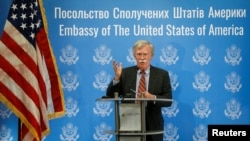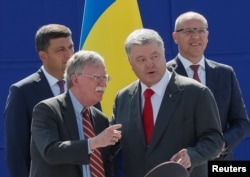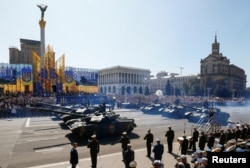U.S. President Donald Trump's National Security Adviser John Bolton said on Friday that U.S. sanctions against Russia would remain in place until Moscow changed its behavior.
Bolton was in Kyiv to show Washington's support for Ukraine which celebrated the 27th anniversary of its independence from the Soviet Union with a military parade on Friday.
The United States has imposed sanctions against Russia to punish it for its 2014 annexation of Ukraine's Crimea, support for pro-Russian separatists in eastern Ukraine, and meddling in the 2016 U.S. presidential election, something Moscow denies.
Critics of Trump have accused him of being soft on Russia and there is a bipartisan push in Congress to impose more sanctions on Moscow.
Bolton, speaking before a new round of sanctions announced by the State Department took effect, set out what he cast as a tough approach by the administration to sanctions.
"The sanctions remain in force and will remain in force until the required change in Russian behavior," Bolton told a news conference after talks with Ukrainian President Petro Poroshenko.
"I underlined what President Trump said in Helsinki to President [Vladimir] Putin that it was the position of the United States that we did not recognize the illegal annexation of Crimea," he said, referring to a U.S.-Russia summit in Finland last month.
"Our view and our policy remain as they have been.”
'More tension'
The Russian ruble has been pushed steadily lower by U.S. sanctions, the latest of which take effect on Monday, according to a notice posted on Friday in the U.S. Federal Register.
Russia's Foreign Ministry said on Friday that the new sanctions, announced earlier this month over a nerve agent attack in Britain, would only create more tension in bilateral relations, the RIA news agency reported.
In comments likely to anger Moscow, Bolton said that Kyiv had made progress in its efforts to join the North Atlantic Treaty Organization (NATO) and advised Ukraine to look for alternatives to Russian natural gas.
Russia strongly opposes NATO expansion towards its western borders and moved to annex Crimea in 2014 after Viktor Yanukovych, Ukraine's Russia-friendly president, was toppled in a popular revolution.
Bolton said it was important to resolve the Ukraine crisis and that it would be dangerous to leave the situation as it was in Crimea and eastern Ukraine, where Moscow has backed separatists in their conflict with Kyiv.
Ukraine stopped buying gas from Russia in November 2015 and now imports gas mostly via Slovakia. Ukrainian energy firm Naftohaz says the gas is "European in origin." Moscow says the gas is still Russian despite Slovakia's intermediary role.
Bolton mentioned U.S. liquefied natural gas and other possible replacements to Russian supplies.
He said he had told Poroshenko that Moscow should not meddle in Ukraine's presidential vote next year.
"President Poroshenko and I agreed that we will look at steps that the United States and Ukraine could take to look at election meddling here," he said.









